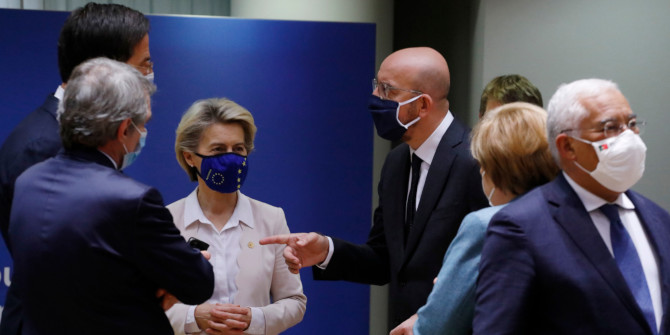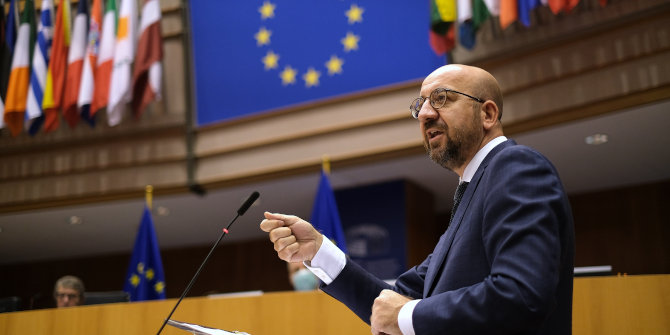Given the crisis facing many countries across Europe, we will be compiling a selection of comments from academics, journalists and other experts on this page. If you would like to have a short comment included, please email the Managing Editor at europpblog@lse.ac.uk
20 March
So, this is what the government of #Singapore (who it might not have escaped you, is good at dealing with #epidemics) is doing. Yes, it's #tracking. I don't think we're going to get away from that… https://t.co/iCmsTG6dLw
— Catherine Fieschi (@CFieschi) March 20, 2020
_________________________________
Tamara Popic has written an article for EUROPP on some early lessons that can be learned for European health systems. She argues that the crisis should prompt a rethink of the direction of healthcare policies across Europe, and that the principle of solidarity must now move to the forefront as countries seek to mitigate the impact of the outbreak.
_________________________________
Why is Germany's death rate so low? High testing rates that net mild cases, younger age profile of those affected, perhaps quality of care. https://t.co/OZprVe4Alk via @FT
— Tom Nuttall (@tom_nuttall) March 20, 2020
_________________________________
Sebastian Horn, Carmen Reinhart and Christoph Trebesch have written a piece for VoxEU documenting responses to previous disasters. They show that “during wars and similar major shocks, governments have been willing to transfer huge sums to their allies and other states in need. During such periods of turmoil over the past two centuries, official capital flows have repeatedly surpassed total private capital flows. Wars, in particular, were accompanied by huge amounts of official cross-border lending, exceeding 10% of US or UK GDP per year.”
19 March
New blog from the BMJ: “In our ongoing preoccupation with the number of “cases” of covid-19, we must not forget that behind every number is an individual”.
_________________________________
Patrick Kaczmarczyk has written for EUROPP on how the EU should respond in political and economic terms to the crisis. He argues that if the EU gets its response wrong, it could ultimately lead to a breakup of Europe’s Economic and Monetary Union:
“The austerity measures introduced over the past decade have already suffocated European economies and fuelled widespread discontent. Except for a short period in Italy, in which Matteo Salvini’s Lega formed a government with the Five Star Movement, the success of right-wing anti-EU parties has hitherto been limited to increasing their political weight, while falling short of obtaining executive power. Yet, in contrast to the double-crisis of 2007-9 and 2010-12, and the subsequent failure of the EMU to respond, these political forces are now in a much stronger starting position. If the EMU is destined to survive, there can be no way back to business as usual.”
_________________________________
#digital surveillance is proving to be an essential tool in our survrillance toolbox against #COVID19 – especialy because not all suspected cases can be tested and there is no way to detrmine the true extent of community spread. @elad1 @isenseIRC https://t.co/vB3mXRxYh0
— Michael Edelstein (@epi_michael) March 19, 2020
_________________________________
A new VoxEU article looks at how economics can help tackle the crisis at its source by reducing the spread of the virus.
_________________________________
I would like to inform you that I have tested positive for #COVID19. I am doing well and in good spirits. I am following all the necessary instructions, as is my team.
For all those affected already, and for all those currently in isolation, we will get through this together.
— Michel Barnier (@MichelBarnier) March 19, 2020
_________________________________
The Lancet has published a new study on the resilience of the Spanish health system against the COVID-19 pandemic:
“Although the Spanish health system has coped well during the 6 weeks since its first case was diagnosed, it will be tested severely in the coming weeks as there is already widespread community transmission in the most affected regions, Madrid, the Basque Country, and Catalonia. The number of new cases in the country is increasing by more than 1000 each day. A crisis such as this places pressure on all building blocks of a health system.”
_________________________________
WOW -> 10yr BTP yields down *105 basis points* on the back of the ECB's announcement. Let's see if it is sustained, but the optimists definitely have it for now. #ECB pic.twitter.com/4ncFZNTH95
— Ferdinando Giugliano (@FerdiGiugliano) March 19, 2020
_________________________________
18 March
VoxEU have published a new ebook, Mitigating the COVID Economic Crisis: Act Fast and Do Whatever It Takes.
_________________________________
Spanish PM Pedro Sánchez is addressing an almost empty national parliament on the government's response to the #coronavirus — the vast majority of MPs are following the debate from home. Impressive image, so weird to hear so few people applauding and so much echo.
— Cristina Gallardo (@gallardo_ortega) March 18, 2020
_________________________________
Some of the morning coverage from papers around Europe:
Swiss newspaper Le Temps has an editorial warning against the politicisation of the World Health Organization, noting that the WHO “has learned from the 2014 fiasco with the Ebola epidemic in West Africa” but that it is “weak financially and dependent on the great powers.”
Spain’s El País has published an article on insufficient testing capacity in the country and the role this is having in the outbreak.
German newspaper Die Welt examines the problem of “speculators pouncing on German companies”, stating that “hedge funds are trying to benefit from the corona crisis and are placing billion-dollar doom bets against stocks”.
In Italy, la Repubblica features an interview with Pope Francis: “During these difficult days we can find small, concrete gestures expressing closeness and concreteness towards the people closest to us, a caress for our grandparents, a kiss for our children, for the people we love. These are important, decisive gestures. If we live these days like this, they won’t be wasted”.
As many people across Europe go into self-isolation, French newspaper Le Figaro has a piece on why the psychological challenges associated with long periods of confinement should not be underestimated.
_________________________________
For the 2nd day in a row China has reported a single domestically acquired case of #Covid19. It has 13 new cases, but 12 were imported from other countries.
There have been 80,894 cases, 69,601 patients have recovered & 3,237 have died. pic.twitter.com/ancITxAMb0— Helen Branswell (@HelenBranswell) March 18, 2020
_________________________________
17 March
French PM warns France may feel obliged to bar UK citizens from entering France if UK doesn’t introduce more stringent measures to contain #coronavirus Quote”We wl find it hard to accept on our territory British citizens who move freely in their own country +then come to France".
— Katya Adler (@BBCkatyaadler) March 17, 2020
_________________________________
Important new data on #COVID19 aerosol and surface viability (hours and days, respectively. Most features like SARS-Cov-1. Virus behavior differs w/ surfaces@NEJM by @DrNeeltje @dylanhmorris and collaborators @NIAIDNews https://t.co/XIMoBI2qWe pic.twitter.com/shTiKugttl
— Eric Topol (@EricTopol) March 17, 2020
_________________________________
How should the EZ tackle the Covid-19 shock? The basic elements are clear. Governments should unleash a large-scale fiscal stimulus, while the ECB launches a credible and sizable bond-buying program to prevent an adverse market reaction. My @bopinion take. https://t.co/GdCaxxLr7K
— Ferdinando Giugliano (@FerdiGiugliano) March 17, 2020
_________________________________
LSE’s Luis Garicano has put together a paper (due to be published later by VoxEU) on the EU’s response. He proposes a package of measures totalling 500 billion euros “to fight the virus, stabilise the European economy and protect its jobs while the economy is in the ‘freezer'”.
_________________________________
Martin Sandbu at the Financial Times has written on the need for huge fiscal spending to tackle the economic impact of the outbreak:
“It now looks like the current downturn will be at least as deep as that caused by the global financial crisis. Economists think Chinese GDP fell by 13 per cent in the first two months of the year. Dramatic contractions are likely in the US and European economies too, with cross-border travel all but shut down and much retail, service and manufacturing activity reduced by isolation and social-distancing measures.”
_________________________________
And just found this helpful table… pic.twitter.com/0zq7NlCbIZ
— Simon Bottery (@blimeysimon) March 17, 2020
_________________________________
Conflicts about #COVID19 responses mount within #EU -does not bode well for better cooperation after the crisis -though not mentioned in this article political destabilisation of EU is also increased by bots who reinforce rumours and assign blame #COVID19 https://t.co/FPE1oTYFpe
— Ilona Kickbusch (@IlonaKickbusch) March 17, 2020
_________________________________
The COVID-19 pandemic is a public health emergency, but it also has the potential to impact on many other elements of European societies beyond health services. Jelena Dzankic and Lorenzo Piccoli have written for EUROPP on the effect the outbreak is having on the uses and meanings of citizenship:
“The recent outbreak of the novel coronavirus shows the role citizenship plays in the context of public health responses to emergencies, including evacuations and quarantines, travel and socio-cultural constraints. If evacuation is a necessary response to a pandemic, citizenship determines precisely which state is responsible for evacuating whom. Yet, the line between protecting the public health of citizens abroad and violation of their human rights can become rather blurred if otherwise healthy individuals are evacuated only to be exposed to a disease through confinement.
Mobility restrictions may well be justified if they target those who may have physically been present in the contaminated areas, but they become a powerful tool for discrimination if their primary target are nationals of particular countries, regardless of other factors (e.g., residence, point of departure, length of stay). Avoidance of handshakes is perhaps necessary to contain the virus, but is it enough of a justification for postponing the conferral of citizenship for those who have met all other conditions? All of this underlines that COVID-19 has infected the uses and meanings of citizenship, too.”
_________________________________
16 March
Another day, another update of our @OurWorldInData #COVID19 figures from the latest WHO release.
You can explore confirmed cases and deaths for all countries: https://t.co/NcIkXpbeKw
Here's the growth across some European countries (on log scale). pic.twitter.com/pVZAhJTkw9
— Hannah Ritchie (@_HannahRitchie) March 16, 2020
_________________________________
1/ Datos actualizados hoy: así evoluciona la curva del coronavirus en España y en varias CCAA 📈 https://t.co/E8ROqFtQ6J pic.twitter.com/59fH0JlIlO
— Kiko Llaneras (@kikollan) March 16, 2020
_________________________________
British government just realised science is a method not a bunch of facts https://t.co/lu8wTmw3RK
— Jonathan Hopkin (@jrhopkin) March 17, 2020
_________________________________
After the Danes yday the Norwegian govt has set out what it will do for workers affected by #COVID19:
🇳🇴 Full pay for those laid off for 20 days.
🇳🇴 Self employed get 80% of their average income the last 3 years – ceiling 600k NOK (£48000).
🇳🇴money for carers of Covid patients.— Lewis Goodall (@lewis_goodall) March 16, 2020
_________________________________
The UK should immediately request a lengthy extension to the Brexit transition period.
Any issue that could distract from tackling coronavirus needs to be set aside. Neither government nor businesses will have the bandwidth to prepare for Brexit in the foreseeable future.
— Thomas Sampson (@thom_sampson) March 16, 2020
_________________________________
NEW chart on coronavirus: we're now tracking death toll trajectories as well as cases
• Deaths in Italy & Spain now growing much faster than they did in China at same stage
• More deaths in Italy in last 24h than on any day in WuhanLive version here: https://t.co/VcSZISFxzF pic.twitter.com/IM3jsHtCCy
— John Burn-Murdoch (@jburnmurdoch) March 15, 2020
_________________________________
LSE’s Lorenzo Codogno has given a comment on the potential impact of the virus on Italy’s economy:
“Italy has gone through many crises, unfortunately… The problem is that, coming from all these crises in the past, the Italian government is weak right now and the public finances situation is even more fragile, so it’s particularly dangerous”.
_________________________________
Experience of Asian markets in SARS & covid-19 is that there is only one rate that really matters: the rate of infections.
When investors see that the disease is getting under control — that is, the infection rate has peaked — optimism returns. 1/
— Simon Rabinovitch (@S_Rabinovitch) March 16, 2020
_________________________________
Jérôme Salomon, the head of France’s health service, has described the situation in the country as “very worrying” and stated that the number of cases is doubling every three days.
_________________________________
Presse du jour pic.twitter.com/hhICPMs4K5
— Eric Guevara-Frey (@eric_gf) March 16, 2020
_________________________________
LSE’s Olivier Wouters has commented on the impact Brexit could have on the UK’s approach to the virus:
“After the Brexit transition period, the UK will no longer be part of the EMA and will therefore have to make its own regulatory decisions, unless ongoing EU-UK trade negotiations result in the UK aligning itself with European rules. The UK could, in theory, choose to recognise any approval decision made by the EMA to prevent delays, but this seems at odds with the UK government’s pledge to ‘take back control’. If the UK authorities instead choose to set up a separate review and approval process for medicines and vaccines, then it might delay access to a new coronavirus therapy. The country could experience disruptions as the Medicines and Healthcare products Regulatory Agency (MHRA), the country’s counterpart to the EMA, works to fill the gap left by the departure of the EMA. Vaccine makers and drug companies may decide to first seek approval from the EMA, which represents some 500 million patients, before seeking approval from the UK MHRA, which covers a smaller patient pool.”
_________________________________
The French Minister of Labour, Muriel Pénicaud, has announced that the country’s unemployment benefit reform will be postponed until 1 September. France held the first round of its municipal elections on Sunday, despite the outbreak of the virus.
_________________________________
15 March
Anthony Costello, former Director of Mother, Child and Adolescent Health at the World Health Organization has voiced concern at the UK’s approach to tackling the outbreak: “They appear to have concluded that it is inevitable most people would get the disease, so we should let the epidemic proceed to allow 60% of the population to become infected and build herd immunity through the wild virus. What is the scientific justification for this departure from WHO policy?”
_________________________________
A new report on demographics and COVID-19 is now available, drawing on data from Italy.
Some deaths appearing at younger ages, but still none under age 30, and >96% of deaths are concentrated at ages 60+.
— Jenn Dowd (@drjenndowd) March 15, 2020
_________________________________
The Spanish government has stated that it may take control of private and military hospitals to help treat those infected with the virus. Minister for Health, Salvador Illa, announced a series of new measures on Sunday.
Please read our comments policy before commenting.
Note: This article is a compilation of responses and does not represent the position of EUROPP – European Politics and Policy or the London School of Economics. Featured image credit: William Murphy (CC BY-SA 2.0)
_________________________________





